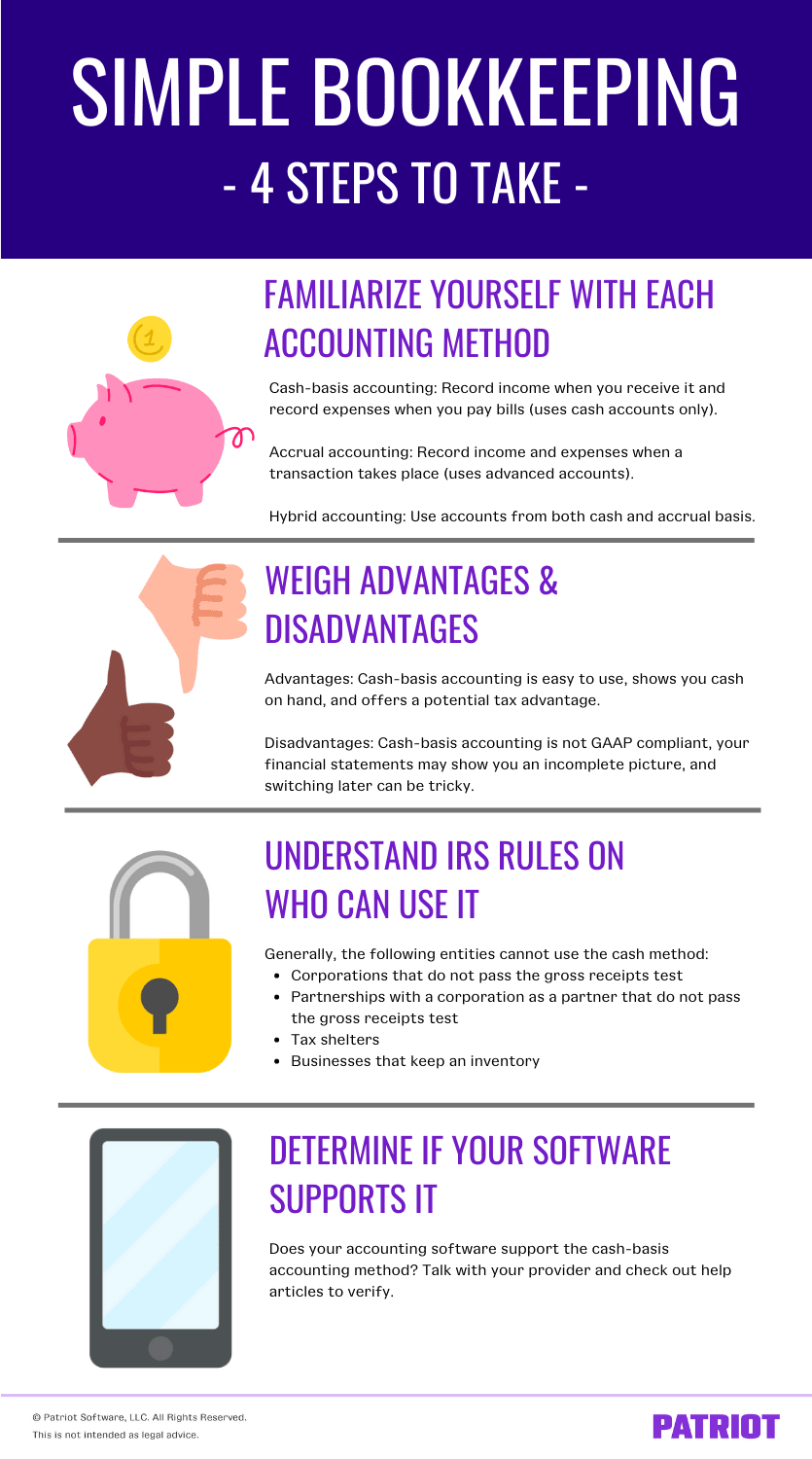Forty percent of small business owners agree that bookkeeping (the process of recording transactions) and taxes are the worst part of the job. Although it might be taxing (no pun intended!), bookkeeping is a key part of business. But, that doesn’t mean you have to make things unnecessarily difficult. For simple bookkeeping, you may consider using the cash method of accounting.
According to the IRS, most individuals and many small businesses use the cash-basis accounting method. Are you one of them? Read on for three simple accounting bookkeeping considerations to make.
Interested in simple bookkeeping? Take these 4 steps first
In order from easiest to most difficult, here are the three primary accounting methods you can choose from:
- Cash-basis accounting
- Hybrid (modified cash-basis) accounting
- Accrual accounting
If you want basic small business bookkeeping, you may jump at the chance to use the cash-basis method. But before you do, you need to take the following four steps.

1. Familiarize yourself with each accounting method
First things first: Understand the basics of the cash-basis, accrual, and hybrid accounting methods to compare your options.
Cash-basis accounting: The cash-basis method is the easiest method to understand and use. After all, it’s the method we all use for our personal finances.
Under this accounting method, you must record income when you receive it and record expenses when you pay bills. Only use cash accounts when using this accounting method.
Accrual accounting: Under the accrual accounting method, you record income and expenses when a transaction takes place, even if money doesn’t physically change hands. As a result, you get a more accurate picture of your business’s total finances.
However, the accrual accounting method is the most complex of the three. You must use more advanced accounts, like accounts payable, inventory, and long-term liabilities.
Hybrid accounting: The modified cash-basis accounting method combines cash-basis and accrual accounting. You can use accounts from both cash and accrual basis.
Because tax rules generally require you to account for inventory using the accrual method, you might use the accrual method’s inventory account and the cash method’s cash accounts for everything else.
2. Weigh advantages and disadvantages
Before choosing the path of simple bookkeeping for small business, consider the pros and cons of cash-basis accounting.
Take a look at the following advantages of cash-basis accounting:
- Easy to use: Short on time? There’s a much smaller learning curve for cash-basis accounting compared to accrual and hybrid. There are fewer accounts to track and details to dive into.
- Shows you cash on hand: Because cash-basis accounting only deals with money when you physically receive or pay it, you can easily see how much cash you have on hand.
- There’s a potential tax advantage: You could potentially decrease your tax liability during the year by speeding up expenses you physically pay and money you physically receive.
Take a look at the following disadvantages of cash-basis accounting:
- It’s not GAAP compliant: Cash-basis accounting isn’t acceptable under the generally accepted accounting principles (GAAP). Public companies must follow GAAP. If your business is not public, you can choose to follow GAAP.
- Financial statements may show you an incomplete picture: Cash-basis accounting shows you how much cash you have on hand. But, it doesn’t show the money you owe or the money customers owe you.
- Switching over can be tricky: If you decide to do cash to accrual accounting method change in the future, you have to go through a few steps (i.e., transition your books and request a change with the IRS).
3. Understand IRS rules about who can use it
Not all businesses can use the cash-basis method of accounting. The IRS imposes certain size limitations on the use of the cash method.
Generally, the following entities cannot use the cash method:
- Corporations (not including S Corps) that do not pass the gross receipts test*
- Partnerships with a corporation as a partner that do not pass the gross receipts test*
- Tax shelters
- Businesses that keep an inventory**
*So, what’s the deal with the gross receipts test? The IRS makes an exception for corporations and partnerships (aka lets them use the cash method) that pass the gross receipts test. To pass, you must have average annual gross receipts for the three prior tax years of $26 million or less.
**Businesses that keep an inventory must use accrual accounting. However, small businesses (i.e., those with average annual gross receipts of $26 million or less for the prior three tax years) can choose not to keep an inventory.
A qualified personal service corporation (PSC) is also able to use the cash-basis method of accounting. To qualify as a PSC, you must meet the IRS function and ownership tests:
- Function test: 95% of your activities must be in the performances in the fields of health, law, engineering, architecture, accounting, actuarial science, performing arts, or consulting.
- Ownership test: A substantial amount of your stock must be directly or indirectly owned during the year at all times by qualifying employees (e.g., those who perform services in a field qualifying under the function test).
For more information on whether you can use the cash-basis accounting method, check out IRS Publication 538.
4. Determine if your software supports it
Last but not least, you may need to make sure your accounting software supports the cash-basis accounting method. Talk with your accounting software provider and check out help articles to verify.
Simple Bookkeeping | Guide to Cash-basis Accounting




